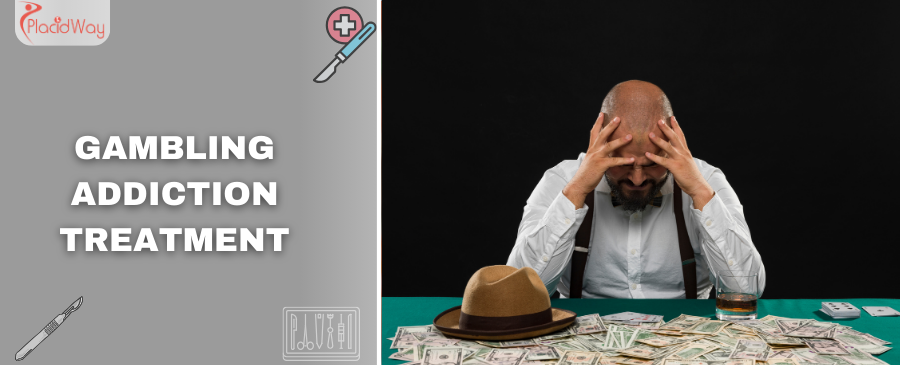
Gambling addiction, also known as compulsive gambling or gambling disorder, is a serious mental health condition characterized by an uncontrollable urge to gamble despite adverse consequences. This addiction can have devastating effects on an individual’s financial stability, relationships, and overall well-being. Gambling addiction treatment focuses on addressing the psychological, behavioral, and social aspects of the disorder, aiming to help individuals regain control of their lives and achieve lasting recovery.
Gambling addiction is a chronic mental health disorder that involves a persistent and uncontrollable need to gamble, often leading to significant negative consequences. It is recognized as a behavioral addiction, similar to substance abuse disorders, due to its impact on brain function and behavior. People with gambling addiction often experience intense cravings, difficulty stopping gambling, and a tendency to chase losses, which can exacerbate financial and emotional problems.
|
Environmental Influences: Exposure to gambling environments or social norms that normalize or glamorize gambling can increase the likelihood of developing an addiction. Social Pressures: Peer pressure or societal expectations related to gambling can influence individuals to engage in and maintain gambling behaviors. Genetic Predisposition: A family history of gambling addiction or other behavioral addictions can increase the risk of developing a gambling disorder. Psychological Factors: Mental health conditions such as depression, anxiety, or stress may drive individuals to use gambling as a form of escape or self-medication. Biological Factors: Changes in brain chemistry and function related to reward and pleasure pathways can contribute to compulsive gambling behaviors. Traumatic Experiences: Past trauma, abuse, or significant life stressors may lead individuals to seek solace or distraction through gambling. Cognitive Distortions: Misconceptions about gambling, such as believing in luck or chance, can perpetuate the addiction and lead to continued gambling despite losses. |
|
Preoccupation with Gambling: Constantly thinking about gambling, planning gambling activities, or finding ways to get money to gamble. Increased Gambling: Betting larger amounts of money over time to achieve the same level of excitement or satisfaction. Chasing Losses: Continuously gambling to try to win back lost money, often leading to deeper financial problems. Neglecting Responsibilities: Failing to meet work, family, or personal obligations due to excessive gambling. Social Isolation: Withdrawing from family, friends, and social activities in favor of spending time gambling. Emotional Distress: Experiencing feelings of guilt, anxiety, or depression related to gambling behavior. Financial Problems: Accumulating significant debt or financial issues due to gambling losses. |
|
Mindfulness and Relaxation Techniques: Incorporating mindfulness practices and relaxation exercises to reduce stress and improve emotional regulation. Cognitive-Behavioral Therapy (CBT): CBT helps individuals identify and change negative thought patterns and behaviors related to gambling, and develop healthier coping strategies. Motivational Interviewing (MI): MI is a counseling approach that helps individuals build motivation and commitment to change their gambling behaviors. Family Therapy: Engaging family members in the treatment process to address relational issues and improve support systems. Group Therapy: Provides a supportive environment where individuals can share experiences, gain insights, and receive encouragement from peers facing similar challenges. 12-Step Programs: Structured programs such as Gamblers Anonymous offer support and a framework for individuals seeking to overcome gambling addiction. Medication-Assisted Treatment (MAT): Certain medications may be prescribed to help manage symptoms of depression or anxiety that co-occur with gambling addiction. |
|
Restored Financial Stability: Developing strategies to manage finances and reduce debt caused by gambling. Enhanced Relationships: Repairing and strengthening relationships with family and friends through improved communication and support. Increased Self-Esteem: Building confidence and self-worth by achieving and maintaining sobriety from gambling. Long-Term Recovery: Developing coping skills and strategies to prevent relapse and maintain long-term recovery. Supportive Environment: Access to a supportive network of professionals and peers who understand the challenges of gambling addiction. Improved Mental Health: Addressing co-occurring mental health issues, such as anxiety or depression, through therapy and support. |
|
Families Impacted by Gambling: Families seeking support and guidance to address the impact of gambling addiction on family dynamics and relationships. Adolescents and Young Adults: Young individuals who are beginning to experience gambling problems and need early intervention to prevent long-term consequences. Individuals with Severe Addiction: Those with advanced stages of gambling addiction who require intensive therapy and support to regain control. People with Co-Occurring Conditions: Individuals who struggle with gambling alongside other mental health issues, such as depression or anxiety, and need integrated treatment approaches. Individuals Committed to Recovery: Those who are motivated to make lasting changes and are ready to commit to a comprehensive treatment plan for long-term recovery. |
|
Gambling Addiction Treatment Centers and Doctors Worldwide |
|
|
Top Addiction Treatment Packages Worldwide |
|
|
Country |
Average Cost (USD) |
|
Costa Rica |
$2,500 - $6,000 |
|
Mexico |
$2,000 - $5,500 |
|
India |
$1,500 - $4,000 |
|
Cuba |
$1,800 - $4,500 |
|
Treatment Goals: Set clear goals and expectations for treatment to ensure that the program aligns with your needs and objectives. Confidentiality: Choose a treatment center that prioritizes privacy and confidentiality throughout the recovery process. Assessment and Evaluation: Obtain a thorough evaluation from a healthcare professional to assess the severity of the addiction and any co-occurring conditions. Insurance and Costs: Verify your insurance coverage and understand the costs associated with different treatment options. Support Systems: Build a strong support network of family, friends, or support groups to provide encouragement and accountability during recovery. Commitment to Treatment: Be prepared for a commitment to both the initial treatment and ongoing maintenance to achieve and sustain recovery. |
It is time to seek professional help for achieving lasting recovery from gambling addiction. PlacidWay Medical Tourism connects you with top-rated treatment centers and experienced professionals specializing in gambling addiction treatment. Book a consultation today to explore your options and find the right treatment plan tailored to your needs. We will help you on the path to a healthier, addiction-free life, providing the support and resources necessary for a successful recovery.